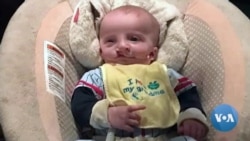One of the most common birth defects throughout the world is a cleft lip. Babies born with a cleft lip may also have a cleft palate, where the roof of the mouth is split. These birth defects can be repaired surgically. But unless that is done, it can result in significant disabilities and even death.
Before Daniel Truglio was born, an ultrasound showed Daniel had a cleft lip and a cleft palate. That's when Dr. Albert Oh at Children's National Medical Center started planning Daniel's surgery. Oh says the ultrasound shows how severe a cleft is.
"You can also tell whether it's one-sided or both sided, and it also gives you a chance to look for other potential associated problems that these babies can have," Oh said.
Daniel was also born with a small jaw -- a complication that can accompany a cleft palate or lip. Doctors created a hole from the front of his neck into his windpipe, so Daniel could breathe. The procedure is called a tracheostomy, or trach for short.
Nine in 10 children with a cleft lip or palate can die without surgery according to Dr. William Magee. Magee founded Operation Smile to repair cleft lips and palates more than 35 years ago.
"More people die from lack of access to surgery, than from malaria, AIDS and TB combined," Magee said.
Operation Smile and similar charities teach repair techniques to doctors in developing countries. Also, Magee says Operation Smile is heavily involved in research.
"We know there's a genetic connection to it and we have now the largest collection of genetic specimens in the world," Magee said.
Three siblings provided the clue for the gene that causes this condition. Dr. Yang Chai led the research at the University of Southern California. Dr. Chai explained his research in a Skype interview.
"Normally you would only see one child in the family of three or four children that develop this birth defect," Chai said.
A genetic mutation accounts for only about a third of the cases so scientists are still searching for other causes.
As for Daniel, he had his cleft palate fixed in May 2017. He needs more surgeries to extend his jaw and fix his teeth. But there's a world of difference between the baby he was then, and the toddler he is today.
Robilyn Truglio, Daniel's mother, reflects on these changes.
"He was getting sick a lot...frequent colds, and he got pneumonia a few times...and he needed a lot more care at that time. He needed a lot of suctioning through his trach, and with getting sick all the time, he was in the hospital a couple of times, but right now if he doesn't get sick, and if he does, it's resolved quickly. And, he is definitely living a happy, health life right now," Truglio said.
Daniel can now breathe on his own. He's a happy toddler, and he is doing many of the things a two-year-old normally does.





